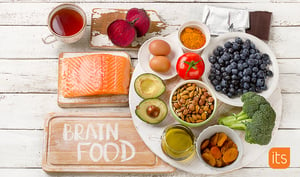See why schools choose a European LMS designed for education over generic platforms.

Brain food: foods that can help keep you focused
Translation generated by an AI translation service
In the realm of modern education, students have access to a wide range of advanced gadgets and tools that assist them in their academic pursuits. However, there is one machine that surpasses them all in importance: the human brain.
In recent years, there has been significant growth in the field of nutritional psychiatry. This field of study has provided valuable insights into how our dietary choices can greatly impact brain function. “Many people think about food in terms of their waistlines, but it also impacts our mental health,” said Dr Uma Naidoo, a Harvard psychiatrist and the director of nutritional and lifestyle psychiatry at Massachusetts General Hospital, to the New York Times.
In order to further explore this captivating subject, we had a discussion with Sara Ahlblom, a gastronome from Sweden. With her extensive experience working with children and the recent completion of a bachelor's degree in Food and Meal Science, Sara offered valuable insights into the complex connection between food and our cognitive abilities.

My interest in food as a social - as well as a nutritional factor - is what brought me to start studying these perspectives. I am currently working with food as a menu creator and seeing the more creative sides of the food industry.
says Sara Ahlblom
As per Sara's expertise, a well-rounded and healthy diet includes necessary vitamins, minerals, and macronutrients required for optimal biological processes. By embracing such a diet, one can fortify the immune system, foster growth and development, and uphold overall well-being. In addition, it is crucial to avoid nutrient deficiencies as they can result in a range of health disorders.
Furthermore, the significance of proper nutrition extends beyond aiding individuals with depression and specific ailments; it also plays a pivotal role in enhancing concentration and promoting brain health. By consuming the right food and maintaining a balanced nutritional intake, one can unlock the potential for improved cognitive abilities.

Unlocking the Power of Brain Food
The idea of "brain food"— nutritious food with the ability to improve cognitive capacities, boost memory, and sharpen focus and concentration—has acquired a lot of popularity. They are packed with necessary vitamins, antioxidants, and other minerals, says the National University in California, USA.
Let’s consider berries, which are well known for their high flavonoid content, and which give our memory processes a much-needed boost and the abundance of omega-3 fatty acids found in fatty fish makes it a perfect example of a true "brain food," as these acids are essential for maintaining cognitive health and avoiding deterioration.
Notably, coffee and tea have both established their positions on the list of cognitive enhancers by demonstrating the capacity to enhance focus and memory. So, without delay, let's explore the variety of foods that have drawn interest for their ability to sharpen the mind.

Source: National University Best Brain Foods for Studying
When it comes to sustaining a nourishing diet throughout the day, Sara offers valuable suggestions. According to her, the key is to consume frequent meals and snacks, ensuring that your body receives a steady stream of nourishment and maintains stable energy levels. This practice becomes particularly crucial when hunger strikes during the day.
Prolonged periods without food can lead to a drop in blood sugar levels, resulting in fatigue, difficulty focusing, and reduced productivity. By eating at regular intervals, you can avoid energy crashes and enhance your mental performance.
Now, you might wonder, how many meals should you aim for each day? We asked this question to Sara, who emphasized that individual responses to dietary habits can vary. However, in her opinion, a minimum of three meals is suggested: breakfast, lunch, and dinner.
And including a snack becomes necessary if you are hungry in between these meals. For Sara, who eats an early lunch and a late dinner, a snack in between meals is essential to preserving good blood sugar levels. It's important to remember that everyone's lifestyle and preferences can differ, which can cause changes in snacking habits.

The Importance of Breakfast: Fuelling Your Day
Mornings can often be a whirlwind, making it challenging to prioritise breakfast, especially when rushing out the door. However, people should try not to skip this vital meal, as it provides the necessary energy to kickstart your day.
According to BSW Health, research indicates that individuals who consume breakfast demonstrate enhanced attention spans and perform better on spatial and cognitive tests.
It’s important to kick-start your metabolism after a (hopefully) good night's sleep. It helps you to feel energised and alert to start your day.
says Sara Ahlblom
Sara highlights that individuals who incorporate breakfast into their daily routine tend to have improved weight management and better control over hunger hormones. Breakfast helps to increase the consumption of calories throughout the day by accelerating the metabolism.
To simplify the morning rush, Sara has a smart tip: prepare overnight oats infused with an abundance of fruits and nuts. This wholesome and convenient option can be effortlessly made the night before, saving valuable time during hectic mornings. By planning ahead and having a pre-prepared breakfast option, you can eliminate the need to ponder over what to eat each day, streamlining your morning routine and ensuring you don't waste time.
Incorporating breakfast into your daily habits and planning ahead are key strategies to unlock the benefits of a nourishing morning meal, supporting weight management and providing sustained energy for a productive day ahead.

Elevate Your Lunch with Brain-Boosting Foods and Hydration
When it comes to lunchtime, Sara offers a valuable tip: opt for dishes that can be eaten cold. Whether it's a refreshing spaghetti salad, cooked root vegetables, or a crisp garden salad, these options are not only delicious but also practical.
They can be conveniently packed in a thermal lunch bag, allowing you the freedom to savour your meal after class without the need for reheating. Sara's second smart suggestion is to always carry food and a water bottle with you.
While our bodies obtain a significant amount of water from the food we consume, if you frequently experience fatigue and dehydration, it may be worthwhile to consider increasing your water intake. Water plays a vital role in facilitating the movement of minerals, carbohydrates, and proteins within our bodies.
On an average day, an adult should aim to consume about 1.5-2 litres of water. However, in hot climates or after physical activities, this amount may need to be adjusted accordingly, though it is important not to exceed the recommended limits, as Sara advises.
To provide inspiration for your daily menu, Sara has thoughtfully prepared a menu to share with you.
- Breakfast - Overnight oats topped with blueberries, strawberries and a few almonds and walnuts.
- Lunch - A whole grain wrap filled with leafy greens, tuna, avocado, pumpkin seeds and garlic/lemon dressing.
- Snack - Carrot Bites with some hummus.
- Dinner - Brown rice with red lentil curry, filled with spinach and tofu.

Improving Brain Health: Adopting a Holistic Approach to a Health Lifestyle
It is important to acknowledge that your body operates as a connected ecosystem. To optimise the benefits for your brain health, it is important to adopt an integrated strategy.
Besides a good diet, try to prioritise getting enough sleep, Mayo Clinic recommends a minimum of 7 hours per night. Quality rest is crucial for supporting optimal brain function.
In addition, it is recommended by researchers at the University of Cambridge to incorporate regular exercise into your routine. They suggest aiming for a minimum of 150 minutes of moderate-intensity activity or 75 minutes of vigorous-intensity activity per week. Research has demonstrated that engaging in physical exercise has a beneficial effect on brain health.
Are you prepared to embark on this journey? Now that you have knowledge about brain foods, try to include them in your daily routine. Experts recommend to minimise the consumption of foods that are high in sugar, processed foods, and excessive alcohol. These can cause rapid changes in blood sugar levels, leading to fatigue and difficulties in concentration.
And most important, consult a dietitian or nutritionist for professional guidance. They can create a personalised and balanced diet plan that suits your specific needs.
Stay in Touch with itslearning
To stay informed about our latest tips and news, simply click here and subscribe to our newsletter. Also, remember to check out our Back to School page.



